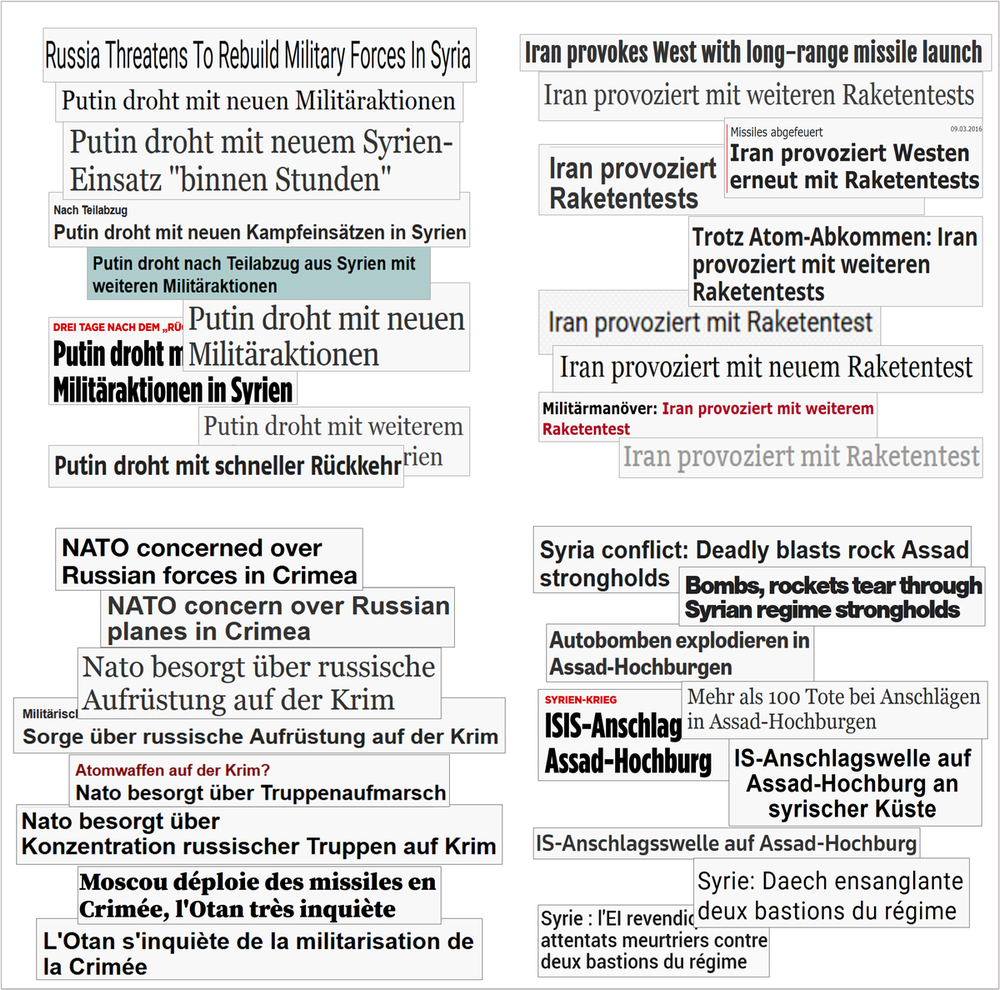
Agency headlines amplified across platforms / Swiss Policy Research
My commentary last week on how the Ukraine conflict is likely to play out evoked a question from a reader : "How is it possible in ZAs media landscape that the best analysis commentary is from a private blog, and in media houses the only international news are Reuters ticker subscriptions"?
The reader in this case has actually answered his own question. There are in effect only three major news sources which feed almost the entire mainstream media landscape in the First World.
1. Associated Press (United States):
Founded in 1846, this is a non-profit organisation with its head office in New York City. It is an unincorporated association whose members are US newspapers and broadcasters. AP produces news reports in English, Spanish, and Arabic.
2. Agence France-Presse (France):
AFP dates back to 1835 in Paris. When German forces occupied France in during World War II, the Vichy regime took it over and renamed it "Office français d'information" (French Information Office). After the war, it became a full-blown state enterprise until 1957 when the French parliament passed a law making the agency "independent". I use the word in quotes because AFP still receives more than €100-million (R1,7-billion) a year from the French government.
3. Reuters (British):
Established in 1851, until 2008, Reuters news agency formed part of an independent company, Reuters Group plc. The parent group merged with Thomson Corporation in Canada in 2008, forming Thomson Reuters which owns the news agency today. Reuters employs around 2500 journalists and 600 photojournalists in about 200 locations worldwide.
In 2016, Swiss Policy Research, a self-proclaimed " independent, nonpartisan and nonprofit research group investigating geopolitical propaganda" drilled down into the influence of these three agencies as part of a larger work called The Propaganda Multiplier: How Global News Agencies and Western Media Report on Geopolitics .
Here are some bullet points:
1. While many countries have their own news agencies, most of them rely on the big three, and simply copy and translate those reports.
2. Newspapers have been known to use agency material but not label it as agency material. This creates the impression that the story is independent, when it is not.
3. Most media outlets do not have their own foreign correspondents, and so rely completely on global agencies for foreign news.
4. Even in scenarios where media outlets send journalists in to cover a major news story, such journalists generally are not on the ground and lack language skills to get accurate information. Quote: "On the Syria war, for example, many journalists 'reported from cities such as Istanbul, Beirut, Cairo or even from Cyprus", but not on the ground in Aleppo or even Damascus.
5. If the global agency does not choose to report, then the news does not take place. (I have frequently highlighted this with regard to the ongoing military incursions by Saudi, US, and UK forces in Yemen.)
So we will always hear reports of "Russian Propaganda" but never "US Propaganda" even though Rolling Stone and The New York Times have written about CIA operatives masquerading as journalists working for the big agencies.
For my part, as an armchair researcher, I try to get around my disabilities (not being on the ground, not speaking the language), by trying to work around those. I find independent media sources such as local newspapers in the place I'm researching. I use Google Translate to give me the essence. And I compare notes with news agencies from Russia, India, China.
I don't trust any of them, but I've learned to try to always filter fact from propaganda.
